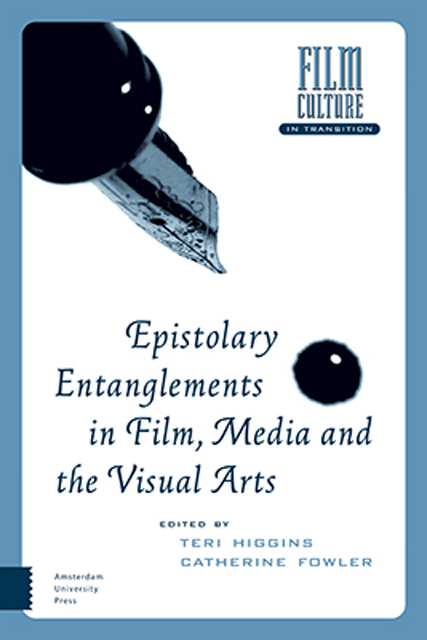Book contents
- Frontmatter
- Table of Contents
- Acknowledgements
- Doing (Audio-Visual) Things with Words – From Epistolary Intent to Epistolary Entanglements: An Introduction
- 1 Performance and Power : The Letter as an Expression of Masculinity in Game of Thrones
- 2 ‘My dearest little girl, I just got your letter and I hope that you will continue to write to me often’: Epistolary Listening in News from Home (Chantal Akerman, 1976)
- 3 Dead Letters: Epistolary Hauntology and the Speed of Light in Personal Shopper (Olivier Assayas, 2016)
- 4 Attention to Detail: Epistolary Forms in New Melodrama
- 5 The Spiritual Intimacies of The Red Hand Files: How Long Will I Be Alone?
- 6 Video Authenticity and Epistolary Self-Expression in Letter to America (Kira Muratova, 1999)
- 7 Epistolary Affect and Romance Scams: Letter from an Unknown Woman
- 8 Delivering Posthumous Messages : Katherine Mansfield and Letters in the Literary Biopic Leave All Fair (John Reid, 1985)
- 9 The Interactive Letter : Co-Authorship and Interactive Media in Emily Short’s First Draft of the Revolution
- 10 Epistolary Distance and Reciprocity in José Luis Guerín and Jonas Mekas’s Filmed Correspondences
- 11 Instagram and the Diary : The Case of Amalia Ulman’s Excellences & Perfections (2014)
- 12 Civil War Epistolary and the Hollywood War Film
- 13 Epistolarity and Decolonial Aesthetics in Carola Grahn’s Look Who’s Talking (2016)
- 14 Epistolary Relays in Fatih Akin’s Auf der anderen Seite (On the Other Side/On the Edge of Heaven) (2007)
- Index
8 - Delivering Posthumous Messages : Katherine Mansfield and Letters in the Literary Biopic Leave All Fair (John Reid, 1985)
Published online by Cambridge University Press: 20 June 2023
- Frontmatter
- Table of Contents
- Acknowledgements
- Doing (Audio-Visual) Things with Words – From Epistolary Intent to Epistolary Entanglements: An Introduction
- 1 Performance and Power : The Letter as an Expression of Masculinity in Game of Thrones
- 2 ‘My dearest little girl, I just got your letter and I hope that you will continue to write to me often’: Epistolary Listening in News from Home (Chantal Akerman, 1976)
- 3 Dead Letters: Epistolary Hauntology and the Speed of Light in Personal Shopper (Olivier Assayas, 2016)
- 4 Attention to Detail: Epistolary Forms in New Melodrama
- 5 The Spiritual Intimacies of The Red Hand Files: How Long Will I Be Alone?
- 6 Video Authenticity and Epistolary Self-Expression in Letter to America (Kira Muratova, 1999)
- 7 Epistolary Affect and Romance Scams: Letter from an Unknown Woman
- 8 Delivering Posthumous Messages : Katherine Mansfield and Letters in the Literary Biopic Leave All Fair (John Reid, 1985)
- 9 The Interactive Letter : Co-Authorship and Interactive Media in Emily Short’s First Draft of the Revolution
- 10 Epistolary Distance and Reciprocity in José Luis Guerín and Jonas Mekas’s Filmed Correspondences
- 11 Instagram and the Diary : The Case of Amalia Ulman’s Excellences & Perfections (2014)
- 12 Civil War Epistolary and the Hollywood War Film
- 13 Epistolarity and Decolonial Aesthetics in Carola Grahn’s Look Who’s Talking (2016)
- 14 Epistolary Relays in Fatih Akin’s Auf der anderen Seite (On the Other Side/On the Edge of Heaven) (2007)
- Index
Summary
Abstract
John Reid's Leave All Fair (1985) addresses the controversial posthumous editing of the letters of Katherine Mansfield. It is a new kind of literary biopic that relies upon epistolary themes and structures, to present a dialogic depiction of Mansfield's characteristic of letter writing. Letters are often shown in flashback, creating an alternative discourse from Mansfield's perspective. Meaning ultimately hinges upon whose Mansfield is invoked in the letters and journal entries. If we view the film as modelling the writer–reader relationship, Mansfield's ambiguous last letter has three different readers, who perform the film's dialogism. Although the editors misrepresent the absent Mansfield, a feminist reading of her epistolarium allows her voice to be re-presented, qualifying this as a feminist or post-feminist biopic.
Keywords: literary biopic; literary film; epistolarium; dialogism; temporal polyvalence; feminism
New Zealand director John Reid's Leave All Fair (1985) is a film that uses letters and journal entries to deliver its messages concerning the ethics of posthumous editing, when letters and journals preserve the legacy of a writer. The writer in question is New Zealander Katherine Mansfield (Jane Birkin), famous for her modernist short stories. Mansfield's husband and editor, John Middleton Murry (John Gielgud), is asked to approve a collected edition of her letters and journals three decades after her death from tuberculosis in Fontainebleau, 1923. This request leads to a flashback narrative that begins with Murry delivering a speech at the launch of the edition. The plot is complicated and thus worth outlining from the start. We see Murry seated at his desk, identifying what the film calls Mansfield's ‘last letter’ – in which she gives Murry contradictory advice about editing her work – with her enduring presence. After an argument between fictitious French editor, André de Sarry (Féodor Atkine), and Mansfield's fictitious feminist double, New Zealander Marie Taylor (also Jane Birkin), we see Murry re-reading the last letter, while being driven to De Sarry's estate. This footage is intercut with flashbacks to Mansfield writing it. Subsequent episodes show Murry meeting De Sarry; watching Taylor's play rehearsal; meeting Taylor in a café, and Taylor arguing with De Sarry about his and Murry's sexist attitudes towards Mansfield. Taylor and Murry discuss Mansfield while visiting an island and De Sarry's family chateau.
- Type
- Chapter
- Information
- Epistolary Entanglements in Film, Media and the Visual Arts , pp. 157 - 172Publisher: Amsterdam University PressPrint publication year: 2023

